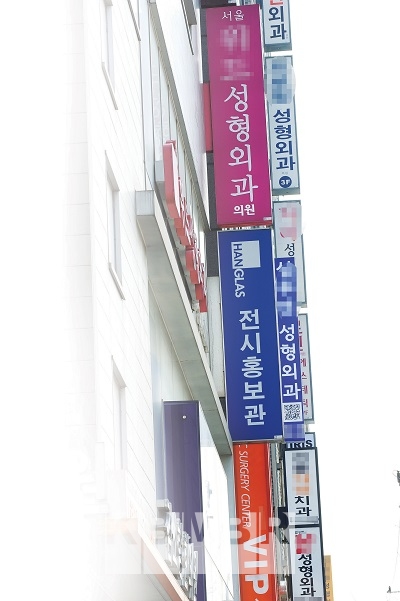Visits to local surgeries fall; reservations canceled
As the Chinese government ratchets up pressure on Korea in various ways to retaliate against Seoul’s deployment of the U.S. antimissile battery, some of the businesses hit hardest are plastic surgeries in Seoul.
The Beijing government has recently released the “seven major guidelines on prohibiting tours to Korea,” telling Chinese tourist agents to stop the sale of tourism products, package tours or free travels, to this country. One of the industries feeling the heat is cosmetic surgery, particularly those in Seoul’s Gangnam and Myeong-dong areas.

So far, practicing surgeons have not felt its adverse effects so keenly, but some of them are heaving a sigh of resignation, as the number of Chinese patients visiting their clinics decreased and cancellations of reservation noticeably increased.
“The Chinese patients visiting our clinic have sharply dropped in number, and even those who have made reservations for surgery are not showing up,” said an official at a Gangnam hospital. “It is dealing a hard blow to our business.”
“As I know, the retaliatory measures caused by the Terminal High Altitude Areas Defense (THAAD) system are wreaking havoc on some other clinics around this area,” he said. “Real problem is the situation will likely aggravate soon.”
A staff member at a clinic in Myeong-dong, downtown Seoul, agreed. “Until recently, Chinese patients accounted for a significant share of our clients and then suddenly the plunged,” she said. “We don’t know the exact reason but presume the THAAD controversy might be the main culprit.”
Some clinics are not feeling its effects much. “The number of Chinese patients has remained unchanged at our clinic before and after the THAAD issue emerged,” The retaliatory actions have not affected the number of patients in any significant ways,” said an official at another surgery in Gangnam, south of the Han River.
PRS Korea, a national organization of plastic surgeons, complained that the diplomatic tension is also affecting the exchange program between cosmetic surgeons of the two countries.
“We often hear the stories of suffering losses from the THAAD friction. Not only has the number of Chinese visitors fallen but it has become difficult for Korean doctors to go to China,” said an official at PRS Korea. “In the past, the bilateral exchange was quite brisk holding joint forums frequently. This year, we will not be able to do so, however.”
The Chinese side is far more sensitive to this issue than Koreans think, he added.

